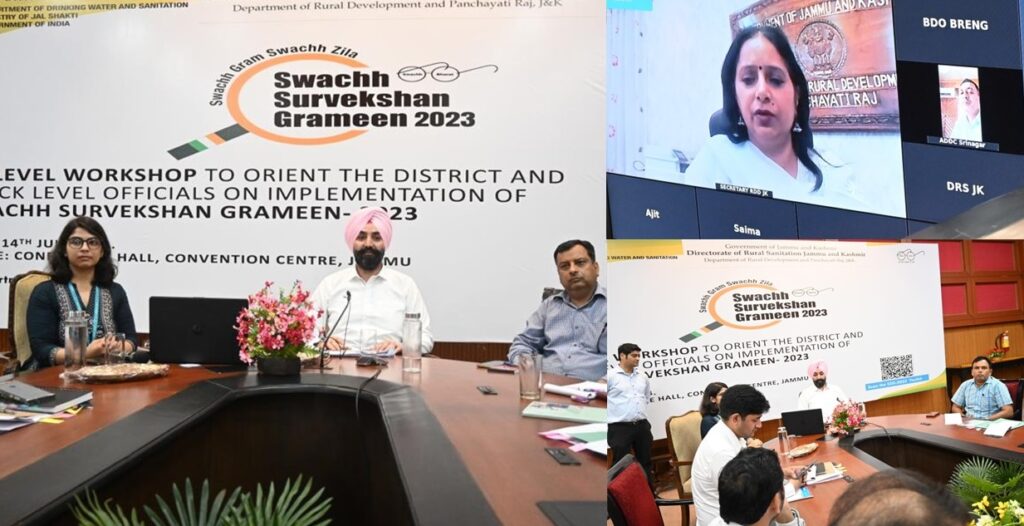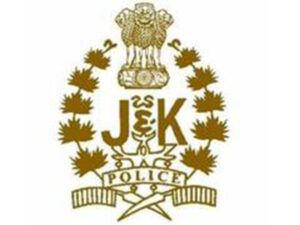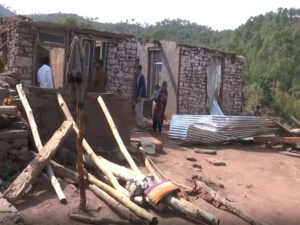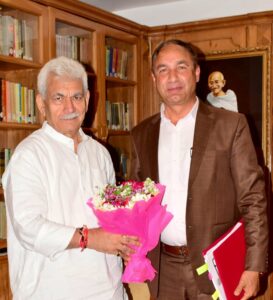Mandeep Kaur inaugurates UT level Workshop on SSG-2023
‘Stresses on effective cleanliness of villages, encouraging behavioural changes, fostering sustainable sanitation practices in rural areas’

JAMMU, July 14: Commissioner Secretary, Rural Development Department and Panchayati Raj, Mandeep Kaur today inaugurated a day-long Union Territory level Workshop virtually to orient the UT, District and Block level officers on survey protocol, ranking parameters and roles and responsibilities for successful implementation of Swachh Survekshan Gramin (SSG) -2023.
The workshop was organized by the Department of Drinking Water and Sanitation, Union Ministry of Jal Shakti, with focus to train the officers of J&K for initiating work on result-oriented parameters. The workshop was conducted in collaboration with Directorate of Rural Sanitation, Department of Rural Development and Panchayati Raj, J&K.
After inaugurating the workshop, the Commissioner Secretary in her address congratulated the officers for achieving 100% target of ODF Plus. She laid emphasis on upholding the same spirit in achieving the ODF Plus Model status and stressed to showcase the same spirit in the SSG-2023, where J&K will be competing with other states to exhibit the success achieved in SBM-G.
The Commissioner Secretary stressed upon the participants for effective cleanliness of villages, promoting awareness, encouraging behavioural changes, accessibility of assets, and fostering the adoption of sustainable sanitation practices in rural areas.
Speaking on the occasion, Director Rural Sanitation, Charandeep Singh said that workshop will provide a platform for participants to exchange ideas, learn from one another, and explore strategies to enhance the effectiveness of SSG 2023. He added that this workshop will also serve as an opportunity to identify areas where additional support, resources, or policy interventions may be required to further strengthen the program’s impact.
The Director encouraged all participants to actively engage in discussions, ask questions, and share their insights throughout the workshop and foster an atmosphere of collaboration and open dialogue so as to collectively strive for making a significant difference in the cleanliness and sanitation of our villages.
He informed the gathering that the department is making random calls to local representatives and people in all districts to gather ground level feedback from them. He added this was being done to counter the disinformation received from some districts.
Assistant Commissioner Panchayats, District Panchayat Officers, Block Development Officers of Jammu division attended the workshop in person. ACPs, ACDs, BDOs and other field staff from Kashmir division attended the workshop virtually.
Pertinently, SSG is a comprehensive assessment program that evaluates the progress and impact of the Swachh Bharat Mission Gramin (SBM-G) in rural areas. This initiative plays a crucial role in promoting awareness, encouraging behavioural changes, and fostering the adoption of sustainable sanitation practices in rural communities.
Department of Drinking Water and Sanitation, Union Ministry of Jal Shakti, has been conducting SSG since 2018 to provide national ranking of all Districts of India based on the qualitative and quantitative rural sanitation parameters to foster a health competition among States, Districts and Panchayats and ascertain the progress of SBM-G.
J&K has also started its village level self-assessment process on ODF Plus parameters in November2022 for all its villages and the final self-assessment of all the villages was completed by April 2023. This was followed by a peer verification process at the block level, where on the basis of assessment conducted blocks nominated the best performing Panchayat to District for being considered for UT level assessment and Awards.
Each district evaluated the best performing panchayats from blocks and forwarded the same to UT in three population categories of 0-2000, 2001-5000 and 5001 and above. Each district had to nominate five panchayats in each of the population categories. All the 20 districts nominated 208 panchayats in three population categories to be considered for awards at the national level.
In order to assess the performance of villages and nominated GPs, Government of India will be sending direct observation teams. The teams would assess the performance of villages on various parameters including cleanliness at public places, household level, solid and liquid management and linkages with plastic water management units.






